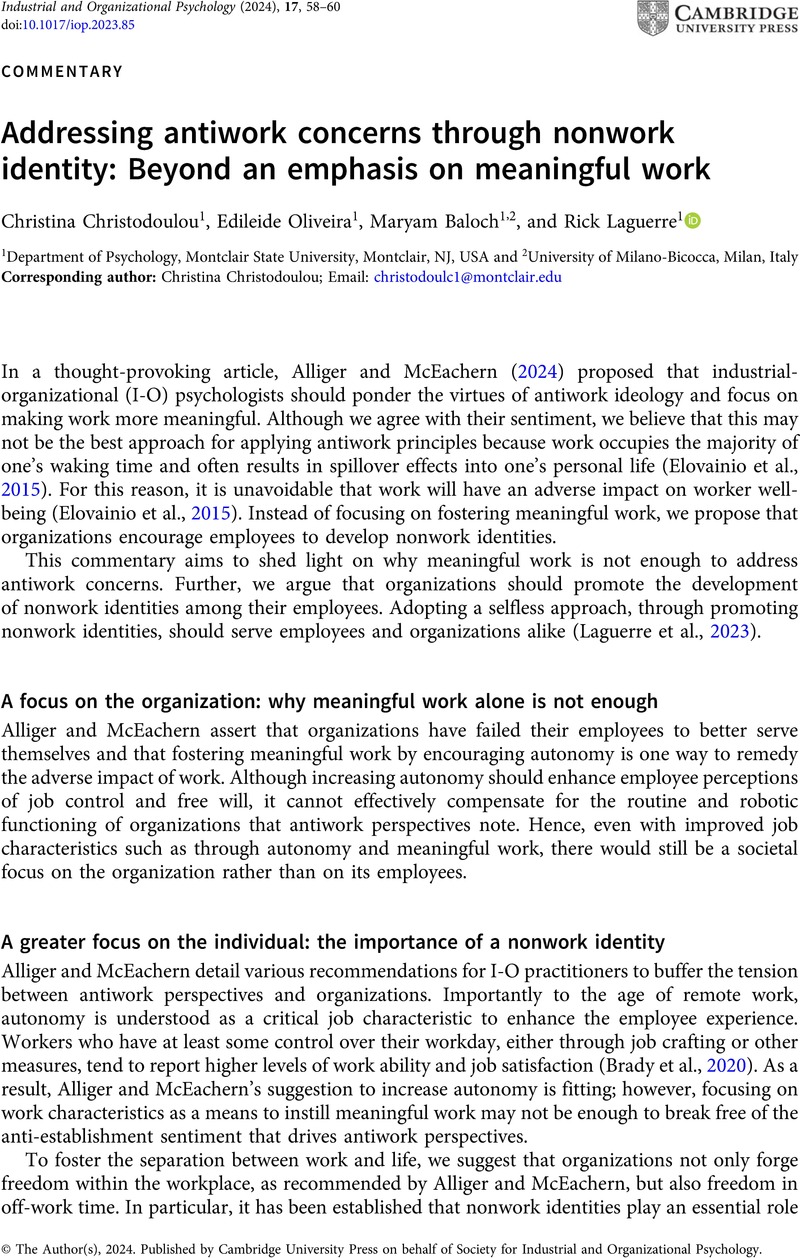No CrossRef data available.
Article contents
Addressing antiwork concerns through nonwork identity: Beyond an emphasis on meaningful work
Published online by Cambridge University Press: 07 March 2024
Abstract
An abstract is not available for this content so a preview has been provided. Please use the Get access link above for information on how to access this content.

- Type
- Commentaries
- Information
- Copyright
- © The Author(s), 2024. Published by Cambridge University Press on behalf of Society for Industrial and Organizational Psychology
References
Allen, D. G., Bryant, P. C., & Vardaman, J. M. (2010). Retaining talent: Replacing misconceptions with evidence-based strategies. Academy of Management Perspectives, 24(2), 48–64.Google Scholar
Alliger, G. M., & McEachern, P. J. (2024). Antiwork offers many opportunities for I-O psychologists. Industrial and Organizational Psychology, 17(1), 1–30.Google Scholar
Amer, S. A., Elotla, S. F., Ameen, A. E., Shah, J., & Fouad, A. M. (2022). Occupational burnout and productivity loss: a cross-sectional study among academic university staff. Frontiers in. Public Health, 10, 861674.Google Scholar
Bakker, A. B., Hakanen, J. J., Demerouti, E., & Xanthopoulou, D. (2007). Job Resources Boost work engagement, particularly when job demands are high. Journal of Educational Psychology, 99(2), 274–284.Google Scholar
Brady, G. M., Truxillo, D. M., Cadiz, D. M., Rineer, J. R., Caughlin, D. E., & Bodner, T. (2020). Opening the black box: Examining the nomological network or work ability and its role in organizational research. Journal of Applied Psychology, 105(6), 637–670.Google Scholar
Dyrbye, L. N., Shanafelt, T. D., Johnson, P. O., Johnson, L. A., Satele, D., & West, C. P. (2019). A cross-sectional study exploring the relationship between burnout, absenteeism, and job performance among American nurses. BMC Nursing, 18
(1), 57.Google Scholar
Elovainio, M., Heponiemi, T., Jokela, M., Hakulinen, C., Presseau, J., Aalto, A.-M., & Kivimäki, M. (2015). Stressful work environment and wellbeing: What comes first? Journal of Occupational Health Psychology, 20(3), 289–300.Google Scholar
Jaussi, K. S., Randel, A. E., & Dionne, S. D. (2007). I am, I think I can, and I do: The role of personal identity, self-efficacy, and cross-application of experiences in creativity at work. Creativity Research Journal, 19
(2-3), 247–258.Google Scholar
Kelly, C. M., Strauss, K., Arnold., J., & Stride, C. (2020). The relationship between leisure activities and psychological resources that support a sustainable career: The role of leisure seriousness and work-leisure similarity. Journal of Vocational Behavior, 117, 103340.Google Scholar
Laguerre, R. A., Bragger, J. D., Cavalcanti, E., Christodoulou, C., Stavely, S., & Russell, M. (2023). Serving decision makers and their employees simultaneously: Adopting a balanced approach. Industrial and Organizational Psychology, 16, 113–116.Google Scholar
Madera, J. M., King, E. B., & Hebl, M. R. (2012). Bringing social identity to work: The influence of manifestation and suppression on perceived discrimination, job satisfaction, and turnover intentions. Cultural Diversity and Ethnic Minority Psychology, 18(2), 165–170.Google Scholar
Özkan, A. H. (2022). The effect of burnout and its dimensions on turnover intention among nurses: A meta-analytic review. Journal of Nursing Management, 30(3), 660–669.Google Scholar
Ramarajan, L., & Reid, E. M. (2013). Changes in work, changes in self? Managing our work and non-work identities in an integrated world. European Business Review, 61–64.Google Scholar




